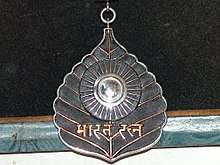Dhondo Keshav Karve
Dhondo Keshav Karve (18 April 1858 – 9 November 1962), popularly known as Maharshi Karve, was a social reformer in India in the field of women's welfare He advocated widow remarriage and he himself married a widow. In his honour, Queen's Road in Mumbai (Bombay) was renamed to Maharshi Karve Road. Karve was a pioneer in promoting widows' education.[1] The Government of India awarded him with the highest civilian award, the Bharat Ratna, in 1958, the year of his 100th birthday.
Dhondo Keshav Karve | |
|---|---|
 Karve on a 1958 stamp of India | |
| Born | 18 April 1858 Sheravali, Dapoli, Bombay Presidency, British India |
| Died | 9 November 1962 (aged 104) Pune, Maharashtra, India |
| Occupation |
|
| Spouse(s) | Radhabai and Godubai |
| Children | Raghunath Karve, Shankar Karve, Dinkar Karve, Bhaskar Karve |
The appellation Maharshi, which the Indian public often assigned to Karve, means "a great sage".
Career as a college professor
During 1891–1914, Karve taught mathematics at Fergusson College in Pune, Maharashtra.[2]
Autobiographical works
Karve wrote two autobiographical works: Ātmawrutta (1928) in Marathi, and Looking Back (1936) in English.
Depictions in popular culture
The Marathi play Himalayachi Saavli (The Shadow of the Himalayas) by Vasant Kanetkar, published in 1972, is loosely based on the life of Karve. The character of Nanasaheb Bhanu is a composite character based on Karve and other Marathi social reformers of the late 19th and early 20th century. The play itself depicts the tension between Bhanu/Karve's public life as a social reformer and his family life due to the social backlash and economic hardships his children and wife had to endure.
The 2001 film Dhyaas Parva by Amol Palekar, based on the life of Karve's son Raghunath, also depicts the Karve family, and their social reformation projects. Taluka Dapoli, a research based initiative, made a documentary on life of Maharshi Dhondo Keshav Karve in 2017.[3]
Awards and honours
- 1952 – awarded Doctor of Letters (D. Litt.) by Banaras Hindu University
- 1951 – awarded D.Litt. by Pune University
- 1954 – awarded D.Litt. by S.N.D.T. University
- 1955 – awarded Padma Vibhushan by the Government of India[4]
- 1957 – awarded LL.D. by University of Mumbai
- 1958 – awarded Bharat Ratna, the highest civilian award of India, by the Government of India[4]
References
| Wikimedia Commons has media related to Dhondo Keshav Karve. |
- Remembering Maharshi Karve, the man who set up India's first university for women India Today. 18 April 2016.
- "Fergusson College Department of Mathematics web page". Archived from the original on 19 June 2006. Retrieved 11 August 2006.
- "Maharshi Dhondo Keshav Karve | Taluka Dapoli". www.talukadapoli.com. Retrieved 1 July 2018.
- "Padma Awards Directory (1954–2007)" (PDF). Ministry of Home Affairs. Archived from the original (PDF) on 10 April 2009. Retrieved 26 November 2010.
